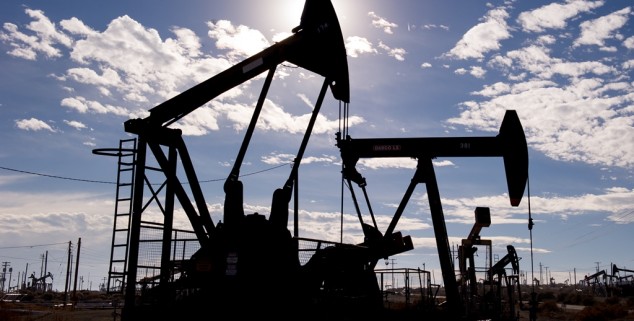Opinion
New fracking rules: Too little, too late
 Pumpjacks in a Kern County oil field, November 2013. (Photo: Christopher Halloran)
Pumpjacks in a Kern County oil field, November 2013. (Photo: Christopher Halloran)They lurk next to homes, apartment buildings and daycare facilities. Many are astonishingly close to classrooms full of young students.
Oil and gas wells are deeply embedded in many California neighborhoods. Because we have no statewide limits on how close such wells can be to homes or schools, millions of Californians live within breathing distance of these polluting oil operations.
California’s new, much-touted fracking regulations simply don’t take into account many troubling risks identified by the science council.
That’s a huge concern — especially as hydraulic fracturing and other extreme oil extraction techniques spread across our state.
Now state lawmakers are taking a closer look at the risks of these neighborhood oil wells. At a state legislative hearing Tuesday on fracking, a California Council on Science and Technology expert will testify about oil industry pollution in our state.
The new scrutiny follows a disturbing new science council report that highlighted health and safety concerns tied to Californians’ disturbing proximity to drilling and fracking.
Let’s hope this expert testimony moves our legislature – and Gov. Jerry Brown – to take swift action.
The science council’s landmark study, which was mandated by a new fracking disclosure law, is supposed to guide our decisions on fracking. But the oil industry is desperate to dismiss its crucial findings. Even state officials aren’t reacting appropriately.
Given the grave risks identified by the science council, Gov. Jerry Brown would have been wise to halt fracking while we examine the dangers. Instead, oil regulators didn’t even wait for the study’s publication before finalizing their fracking environmental assessment and regulations.
Let’s be clear: California’s new, much-touted fracking regulations simply don’t take into account many troubling risks identified by the science council.
Water contamination is one key concern. “Hydraulic fracturing operations could contaminate groundwater through a variety of pathways,” the report says. And, it notes, there has been “little to no systematic monitoring of aquifers in the vicinity of oil production sites.”
California even allows oil companies to dump oil wastewater, which can contains fracking fluid and dangerous chemicals, into unlined pits.
Fracking threatens our water because the industry employs some very dangerous substances. The report found that oil companies “have unrestricted use of many hazardous and uncharacterized chemicals in hydraulic fracturing.”
Fourteen chemicals used in fracking in our state are among the world’s most toxic compounds. And, the report found, a majority of fracking chemicals are so poorly studied that we don’t know what risks they may pose.
The report also found that most fracking in California takes place much closer to the surface than in other states.
Science council experts say this shallow fracking — which constitutes three-quarters of the fracking done in California — is so dangerous to underground water that officials shouldn’t permit it unless they can somehow be sure it won’t pollute aquifers.
California even allows oil companies to dump oil wastewater, which can contains fracking fluid and dangerous chemicals, into unlined pits – a practice the science council says has already polluted our water. That’s on heels of regulators’ admission that they allowed another dumping method, injection wells, to contaminate scores of protected aquifers.
But when it comes to neighborhood oil wells, another key finding might be even more troubling. The science council concluded that air pollution “concentrated near all oil and gas production could present health hazards to nearby communities in California.”
Fracking leads to the emission of toxic air pollutants like benzene and formaldehyde. Even wells that aren’t fracked can pollute the air nearby, and the closer someone lives to an active well, the greater the risk.
That’s why the science council report calls for a minimum setback distance between all oil wells — fracked or not — and homes, schools or other places where people could be exposed to toxic pollution.
The science council’s findings echo other assessments. Health professionals in New York State, for example, reviewed hundreds of studies and concluded that fracking should be banned.
Here in California, state rules don’t protect us from these risks. Oil companies can — and do — frack next to our underground water and near schools.
That’s unsafe, unfair and unacceptable. It’s time for state lawmakers and Gov. Brown to protect our air and water — and the millions of Californians who live near oil and gas wells.
—
Ed’s Note: Hollin Kretzmann is a staff attorney for the Center for Biological Diversity.
Want to see more stories like this? Sign up for The Roundup, the free daily newsletter about California politics from the editors of Capitol Weekly. Stay up to date on the news you need to know.
Sign up below, then look for a confirmation email in your inbox.

Leave a Reply